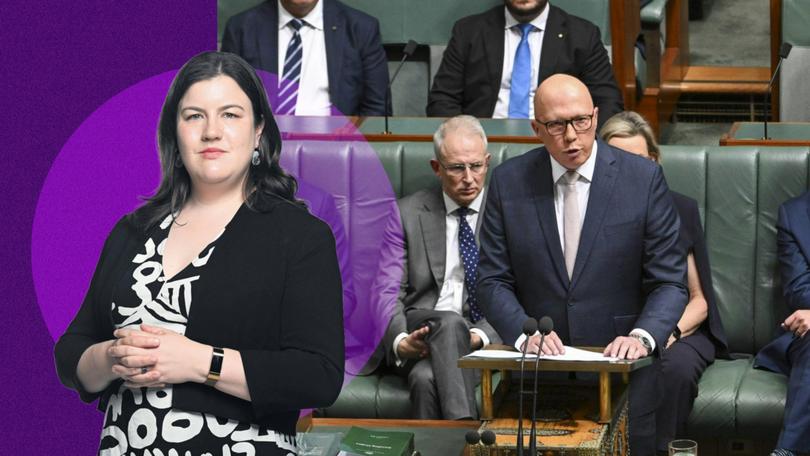KATINA CURTIS: The Coalition does have policies. But it's failing at selling them
KATINA CURTIS: The Government’s two main lines of attack on the Opposition are that it says no to everything (Anthony Albanese has revived the Abbott-era “no-alition” tag) and that it has no policies.

Peter Dutton announced seven specific policies, three broad-brush ones and promised a further three in his budget reply speech.
Not that you’d know if you went looking for them.
The Government’s two main lines of attack on the Opposition are that it says no to everything (Anthony Albanese has revived the Abbott-era “no-alition” tag) and that it has no policies.
Sign up to The Nightly's newsletters.
Get the first look at the digital newspaper, curated daily stories and breaking headlines delivered to your inbox.
By continuing you agree to our Terms and Privacy Policy.The Coalition clearly does have policies but its sales job has been poor.
Labor in opposition proved to be strong at communicating what its plan was.
Whether you agreed or disagreed with their agenda, there were press releases, background notes, websites and social media posts galore to find out what they were planning.
The Future Made in Australia strategy that formed a centrepiece of this year’s Budget was first mooted in Anthony Albanese’s first budget reply speech, in 2020, and backed up with a press release.
Even at the end of Labor’s first term in opposition — a comparable point to where the Coalition is now — Bill Shorten’s policy announcements in the 2016 budget reply were backed by more detailed press releases.
So what, you might say, only a handful of journalists will ever look at a press release.
But it gives something concrete that you can return to even years later, judge progress by and see the through lines of political narratives.
Perhaps at a most basic level, having something written down keeps everyone in the team on the same page.
Out of Dutton’s speech, only the mooted cuts to migration have received much attention and the Opposition has stuffed up the selling of that policy.
Frontbenchers — including the leader — gave a series of different explanations over the following 10 days about what its policy actually is.
Even a senior party official concedes it would have been better-had everyone been reading from the same song sheet on migration.
Apart from the text of Dutton’s speech, there was nothing distributed setting out what the planned cuts to permanent or net migration were or how they would be achieved.
The Liberal Party’s website has a splashy landing page announcing “Get Australia back on track — read our plan”. But the linked page is a cut-down version of the budget reply.
Take another example: Dutton announced a $400 million package to entice more young doctors to become GPs.
After some pushing from my colleague Gabrielle Becerra Mellet, the Opposition explained the policy was to offer $32,500 top-up payments in a scheme similar to that aimed at getting more people into apprenticeships.
This makes sense as an area to offer something solid in; access to affordable healthcare is consistently nominated as the most pressing issue for Australians behind cost of living.
But where was the follow-up from his shadow health minister Anne Ruston? Where were the frontbenchers traipsing the country meeting people who can’t get into a doctor? How many MPs grabbed social media graphics from the central FYI pot to promote it?
Dutton held a roundtable with GPs in Perth (his first public appearance in teal-tinged Curtin) but this was his only health-focused event in a week.
Other policies — shepherding the States into tougher, consistent knife crime laws down the track, creating Commonwealth criminal offences for cyberstalking and abuse in domestic violence cases — have vanished from public sight.
Big policies on nuclear power and tax cuts keep being promised but are yet to eventuate.
Classical theorist Carl von Clausewitz defined strategy as the use of engagements for the purpose of the war.
That is, you have to make sure every skirmish, every public outing, every speech, furthers the bigger picture and connects from one to the other.
It also makes the sequencing of events important so they build up logically — something Albanese is fond of talking about — while needing to leave room for nimbleness in responding to events.
If the purpose of the war is to win the next election (another Clausewitz observation that often gets an airing is that war is policy with other means) then every outing should be building towards that goal.
Some within the Coalition note that, as an Opposition, they have a higher “credibility gap” to convince voters they really do have a plan for the future.
Explaining their policies would be a start to bridging that gap.

